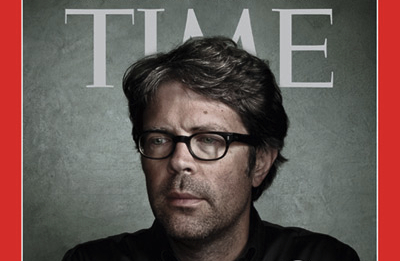The Role of the Novelist: How Jonathan Franzen Won the Book Publicity Game

I can still vividly remember reading, back in 2001, the New York Times Magazinewrite-up on the release of The Corrections. It began:
Some days, Jonathan Franzen wrote in the dark. He did so in a spartan studio on 125th Street in East Harlem, behind soundproof walls and a window of double-paned glass. The blinds were drawn. The lights were off. And Franzen, hunched over his keyboard in a scavenged swivel chair held together with duct tape, wore earplugs, earmuffs and a blindfold. ”You can always find the ‘home’ keys on your computer,” he says in an embarrassed whisper, explaining how he managed to type under such constraints. “They have little raised bumps.”
What could drive a man to such madness? Later in the piece, I learned:
”I’m very concerned with providing a maximally enthralling experience,” Franzen says of his work. ”Another 20 years of boring literary novels, and the thing’s dead.”
Even then, this struck me as a wonderful piece of theater. Imagine persuading the Times that you’ve personally saved the novel—blindfolded!
I don’t mean to suggest that Franzen was fibbing about his work habits. Actually, I’d be shocked if the anecdote weren’t true. What I’m suggesting is that it’s possible to inhabit a role so fully that you disappear into it; that’s as true of authors and corporate executives as it is of actors. Yeats thought Oscar Wilde was forever playing the part of Oscar Wilde, and in fact we remember Wilde’s persona better than his brilliant, but spotty, literary output. More to the point, we still view his persona as authentic.
Something similar has happened with Franzen. He is now the literary celebrity of our age: a presidential favorite, a “Great American Novelist” according to the cover of Time magazine. Increasingly he’s called upon by journalists to speak for book culture as a whole. Yet he may be best known for expressing ambivalence about publicity—at least, a certain kind of publicity—in advance of his first appearance on The Oprah Winfrey Show. He told NPR at the time:
So much of reading is sustained in this country, I think, by the fact that women read while men are off golfing or watching football on TV or playing with their flight simulator…I continue to believe that, and now, I’m actually at the point with this book that I worry…I had some hope of actually reaching a male audience, and I’ve heard more than one reader in signing lines now in book stores that said, “If I hadn’t heard you, I would have been put off by the fact that it is an Oprah pick. I figure those books are for women and I would never touch it.” Those are male readers speaking. So, I’m a little confused about the whole thing now.
Was this snobbery? Calculated provocation? Genuine distaste for the way books are marketed? I’d guess primarily the third, but it hardly mattered: the cancellation of his appearance earned him more notoriety than an enthusiastic acceptance ever would have. It didn’t even cost him a chat with Oprah; he ended up appearing on the show in 2010.
It is this tortured relationship with fame that has made Jonathan Franzen so famous. He has won the book publicity game because part of him—but only part—despises it. So great is his anxiety about the role of the novelist in our culture that it has become integral to his literary persona. And as happened with Wilde, Norman Mailer, even Hemingway, his persona now threatens to overshadow his work.
Understanding this persona requires looking back, as the Times Magazine article did, to a well-known essay he published in Harper’s in 1996. In some ways this is the best thing Franzen’s ever written; certainly it’s the most central to his project. It begins a bit preciously, with the title “Perchance to Dream” and the following sentence:
My despair about the American novel began in the winter of 1991, when I fled to Yaddo, the artist’s colony in upstate New York, to write the last two chapters of my second book.
By the end, however, it has transformed into a probing meditation on the connection between art and society, between the American novelist and America itself. Observing that “just as the camera drove a stake through the heart of serious portraiture and landscape painting, television has killed the novel of social reportage,” Franzen confronts the hopelessness of “bringing the news” to his culture. After much soul-searching, he concludes—buoyantly and accurately—that this loss is no loss at all. Great novelists hone their insights into society by observing human character, not cultural ephemera:
I’m amazed, now, that I’d trusted myself so little for so long…as if, in peopling and arranging my own little alternate world, I could ignore the bigger social picture even if I wanted to.
Every literary critic who is also a literary author writes to some degree with the goal of clearing ground for his own work. Franzen is no exception, but his Harper’s essay doesn’t so much shill for his aesthetic as dissect it. He ventures a thoughtful self-critique—or self-correction—framed by a personal narrative of depression and recovery.
Yet the essay tells another story, too. Even as Franzen was pondering his aesthetic, he was also thinking through his book publicity strategy:
The writer for whom nothing matters but the printed word is, ipso facto, an untelevisable personality, and it’s instructive to recall how many of our critically esteemed older novelists have chosen, in a country where publicity is otherwise sought like the Grail, to guard their privacy. Roth, McCarthy, Don DeLillo, William Gaddis, Anne Tyler, J. D. Salinger, Thomas Pynchon, Cynthia Ozick, and Denis Johnson all give few or no interviews, do little if any teaching or touring, and in some cases decline even to be photographed…for some of these writers, reticence is integral to their artistic creed.
…In 1955, before television had even supplanted radio as the regnant medium, Gaddis recognized that no matter how attractively subversive self-promotion may seem in the short run, the artist who’s really serious about resisting a culture of inauthentic mass-marketed image must resist becoming an image himself, even at the price of certain obscurity.
For a long time, trying to follow Gaddis’s example, I took a hard line on letting my work speak for itself. I refused to teach, to review for the Times, to write about writing, to go to pub-industry parties. To speak extranovelistically in an age of personalities seemed to me a betrayal….I had a cosmology of silent heroes and gregarious traitors.
Silence, however, is a useful statement only if someone, somewhere, expects your voice to be loud. Silence in the Nineties seemed only to guarantee that I would be alone. And eventually it dawned on me that the despair I felt about the novel was less the result of my obsolescence than of my isolation.
A quiet humor runs through this passage, and it’s not clear that the author is in on the joke. Franzen claims that his initial posture—the august silence of a Pynchon or DeLillo—hindered his loftiest goals as an artist: engaging with the culture, making a “useful statement.” An alternative reading would be that he found this posture less marketable than he’d hoped, and decided he’d better try another one. “Certain obscurity” is a steep price to pay over the long haul; besides, self-advertisement had worked for Mailer…
And so with a new book in the works, Franzen took to the pages of Harper’s, opining on the talent in the room, the condition of the novel, the condition of his novel. Nor did he court success through public gestures alone; his private life, too, he shaped ergonomically to the purpose. The very furniture of that tiny Harlem studio—the drawn blinds, the duct-taped chair—set the stage for his coup. Ears plugged, eyes covered, he willed himself to become the figure he’d dreamed of being, a figure he feared might go extinct: the celebrated novelist.
As for the novel he created, it didn’t live up to its grandiose billing, but it hardly flopped. I consider James Wood’s review for The New Republic definitive and won’t try to top it; suffice to say, The Corrections contains passages of great depth and passages (for example, all the sex scenes) that set my teeth on edge. At any rate, it was good enough: Franzen had called his shot and hit, if not a home run, then at least a solid double. He was tapped for the National Book Award and, of course, Oprah’s Book Club. As a literary name and a popular favorite, he had arrived.
At the same time he had become, as a social reporter, out of date. In a cruel irony, 9/11 struck a week after the publication of The Corrections, turning the late-’90s culture he had carefully field-researched into an instant fossil. True, some of the book’s topical concerns survived, but the whole scale of its landscape had changed. Wood’s essay, published just six weeks later, pointed out passages that already looked obsolete. More broadly, it traced TheCorrections’ internal divide between breezy journalism and authentic character study, suggesting that the book’s fate would depend—sooner than expected—on its commitment to the latter.
Franzen may have disagreed: in fact he’s never quite taken the medicine he prescribed in his Harper’s essay. His fiction remains chock full of social reportage, sometimes to the point of congestion. I have yet to read Freedom, but the excerpts quoted in reviews were not encouraging in this regard. Part of Franzen clearly likes playing social reporter; and not just reporter, but critic; and not just in his fictional worlds, but in the real one. During the past year Franzen has weighed in on everything from Twitter to e-books to Occupy Wall Street, causing more than one stir in the process. The man who once scorned “gregarious” authors is now the only novelist in America more famous for what he says than what he writes.
But he is famous, too, for what he writes, and there’s something admirable in that double achievement. I don’t love Franzen’s fiction and I don’t care for all of his opinions, but I can’t help paying attention to both. He knows that a writer’s first obligation is to his audience (“The reader is a friend,” he has said, “not an adversary, not a spectator”), and he is willing to extend that obligation beyond the page. Even as many of his fellow novelists continue to hide in their sanctuaries, he has taken off his shoes, waded into the culture, and mucked around a little.
At the same time, he hasn’t disguised the wariness of his steps, his occasional disgust with the muck of it all. On paper he can seem brash, on camera, shy; but he has yet to become overly prolific on the one hand, or to give up appearing before cameras on the other. Being interviewed “isn’t my favorite thing,” he told the Onion A.V. Club in 2010, “but I like TV interviews…[even though] I hate seeing myself.”
In short, Franzen is a man as internally divided as any of his characters, an impossible combination of Salinger and Mailer, and as such he compels us. The novel never really needed saving, nor would he have been a likely savior; but the role of the novelist—as suffering artist, as public intellectual—was in its death throes, and he has restored it to an eminence not seen on the American stage in decades.
[Image: Dan Winters, Time. Courtesy time.com.]





